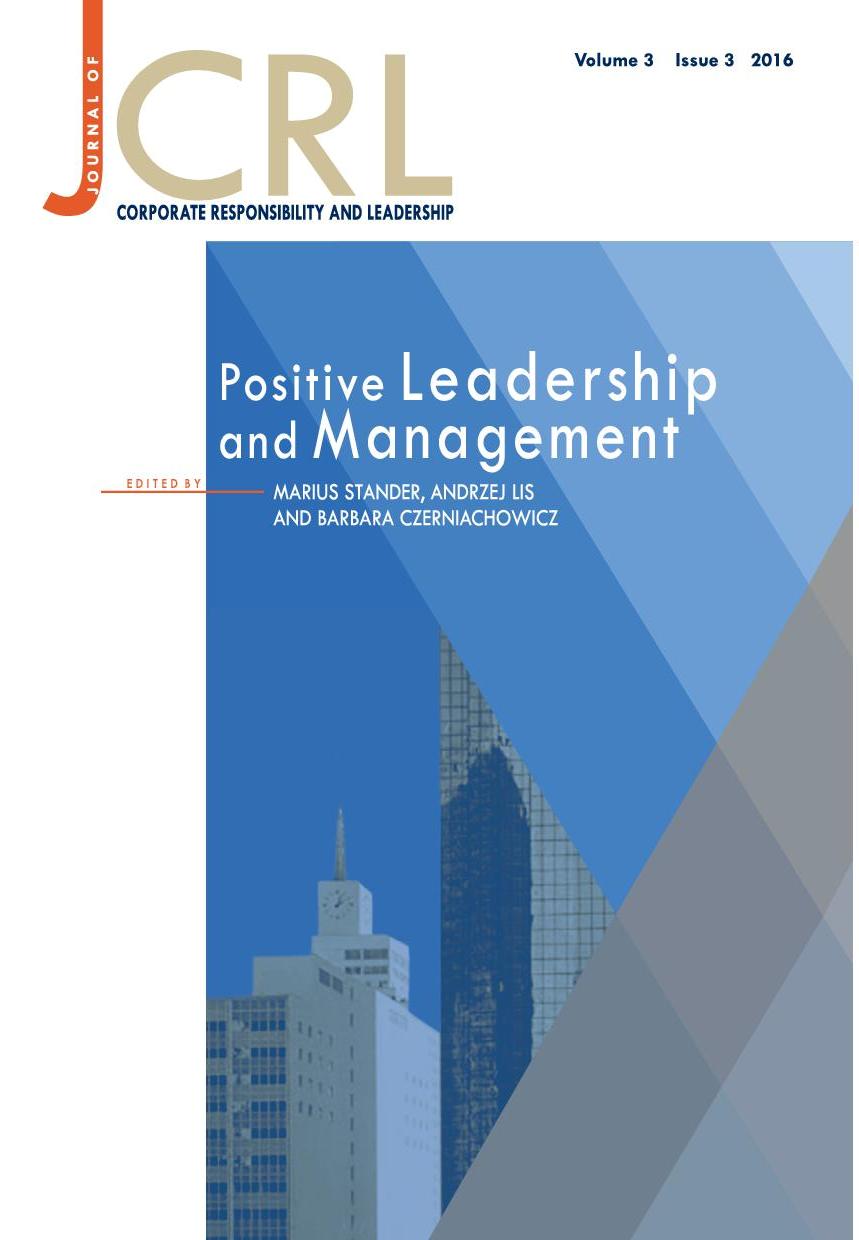Effective Leadership and its Impact on an Organisation’s Success
DOI:
https://doi.org/10.12775/JCRL.2016.017Słowa kluczowe
leadership, managerial functions, roles and skills, approach, organisation’s success, personal contractAbstrakt
The aim of this literature review paper is to show the most important differences between a manager and a leader and to present various definitions of leadership in the context of an organisation’s market success. The author intends to highlight the most popular approaches to leadership, together with the concept of positive leadership, present selected factors influencing leadership effectiveness, including principles of a personal contract, and give ‘food for thought’ for present and future leaders willing to succeed in more and more demanding environment. Finally, a case study of Henri Strzelecki, a charismatic British leader and manager of Polish extraction is described. The findings of the case study are based on the author’s observations and interviews constituting the ethnographic research carried out both in the Polish and the English premises of Mr. Strzelecki’s company.
Bibliografia
Aldag, R.J., Stearns, T.M. (1987), Management, South-Western Publishing Co., Cincinnati.
Blake, R.R., McCanse, A.A. (1991), Leadership Dilemmas – Grid Solutions, Gulf Publishing Company, Houston.
Cameron, K. (2012), Positive Leadership: Strategies for Extraordinary Performance, Berrett-Koehler Publishers, Inc., San Francisco.
Donnelly, J.H., Gibson, J.L., Ivacevich, J.M. (1992), Fundamentals of Management, IRWIN, Boston.
Drzewiecki, A., Chełmiński, D., Kubica, E. (2011), Dobre przywództwo, Oficyna a Wolters Kluwer business, Kraków.
Enkelmann, N.B. (2000), Charyzma, Wydawnictwo Studio Emka, Poznań.
Glińska-Neweś, A. (2007), Kulturowe uwarunkowania zarządzania wiedzą w przedsiębiorstwie, TNOiK Dom Organizatora, Toruń.
Griffin, R.W. (1996), Podstawy zarządzania organizacjami, Wydawnictwo Naukowe PWN, Warszawa.
Johnson, R. (2014), “5 Different Types of Leadership Styles”. Retrieved from: http://smallbusiness.chron.com/5-different-types-leadership-styles-17584.html (accessed 07 August 2015).
Kopperud, K.H, Martinsen, O., Humborstad, S.I.W. (2014), “Engaging Leaders in the Eyes of the Beholder: On the Relationship Between Transformational Leadership, Work Engagement, Service Climate, and Self-Other Agreement”, Journal of Leadership & Organizational Studies, Vol. 21, Issue 1, pp. 29 – 42.
Kostera, M., Kownacki, S., Szumski, A. (2002), “Zachowania organizacyjne: Motywacja, przywództwo, kultura organizacyjna”, in: Koźmiński, A.K. (Ed.), Zarządzanie: Teoria i praktyka, Wydawnictwo Naukowe PWN, Warszawa, pp. 311 – 368.
Lewis, S. (2011), Positive Psychology at Work: How Positive Leadership and Appreciative Inquiry Create Inspiring Organizations, Wiley-Blackwell, Chichester.
Lowenhaupt, R.J. (2014), “The Language of Leadership: Principal Rhetoric in Everyday Practice”, Journal of Education Administration, Vol. 52, Issue 4, pp. 446 – 468.
Nieckarz, Z. (2011), Psychologia motywacji w organizacji, Difin, Warszawa.
Nogalski, B., Apanowicz, J., Rutka, R., Czermiński, A., Czerska, M. (2002), Zarządzanie organizacjami, TNOiK Dom Organizatora, Toruń.
Pocztowski, A. (2003), Zarządzanie zasobami ludzkimi: Strategie – procesy – metody, Polskie Wydawnictwo Ekonomiczne, Warszawa.
Pugh, D.S. (1997), Organisation Theory: Selected Readings, Penguin Books, London.
Robbins, S.P. (1997), Managing Today, Prentice Hall, New Jersey.
Schuetz, A. (2014), “A Story of a Polish Man and Two Crowns”, Magazyn Sucholeski, June, No. 6(29), p. 22.
Shockley-Zalaback, P.S. (2006), Fundamentals of Organizational Communication: Knowledge, Sensitivity, Skills, Values, Pearson Education, Boston.
Stoner, J.A.F., Freeman, R.E., Gilbert, D.R. Jr. (2001), Kierowanie, Polskie Wydawnictwo Ekonomiczne, Warszawa.
Wellin, M. (2013), Zarządzanie kontraktem psychologicznym, Oficyna a Wolters Kluwer business, Kraków.
White, P. (2014), “Improving Staff Morale through Authentic Appreciation”, Development & Learning in Organizations: An International Journal, Vol. 28, Issue 5, pp. 17 – 20.
Wołowska, A. (2013), Przywiązanie do organizacji a kontrakt psychologiczny, Wydawnictwo Naukowe UMK, Toruń.
Pobrania
Opublikowane
Jak cytować
Numer
Dział
Statystyki
Liczba wyświetleń i pobrań: 4196
Liczba cytowań: 0



